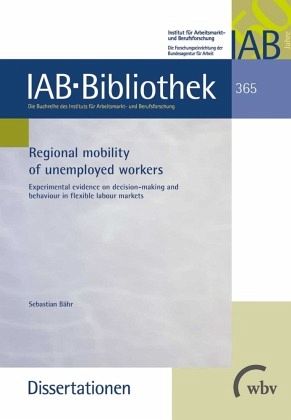Nicht lieferbar

Regional mobility of unemployed workers
Experimental evidence on decision-making and behaviour in flexible labour markets
Herausgegeben: Institut für Arbeitsmarkt- und Berufsforschung (IAB)
Versandkostenfrei!
Nicht lieferbar
Moderne Arbeitsmärkte erfordern ein hohes Maß an Flexibilität von Arbeitskräften und insbesondere von Arbeitslosen. Dabei kommt der Bereitschaft zur regionalen Mobilität im Zuge der tiefgreifenden Hartz-Reformen des deutschen Arbeitsmarktes eine zentrale Rolle zu. Vor diesem Hintergrund untersucht diese Forschungsarbeit die Bedeutung überregionaler Mobilität im Stellensuchprozess von Arbeitslosen. Basierend auf innovativen experimentellen Forschungsdesigns, reichhaltigen administrativen und Befragungsdaten und unter Verwendung aktueller ökonometrischer Analysen leistet Sebastian Bähr ...
Moderne Arbeitsmärkte erfordern ein hohes Maß an Flexibilität von Arbeitskräften und insbesondere von Arbeitslosen. Dabei kommt der Bereitschaft zur regionalen Mobilität im Zuge der tiefgreifenden Hartz-Reformen des deutschen Arbeitsmarktes eine zentrale Rolle zu. Vor diesem Hintergrund untersucht diese Forschungsarbeit die Bedeutung überregionaler Mobilität im Stellensuchprozess von Arbeitslosen. Basierend auf innovativen experimentellen Forschungsdesigns, reichhaltigen administrativen und Befragungsdaten und unter Verwendung aktueller ökonometrischer Analysen leistet Sebastian Bähr einen wichtigen Beitrag zur aktuellen Debatte über die Wirkung von Flexibilisierung auf soziale Ungleichheit am Arbeitsmarkt.




